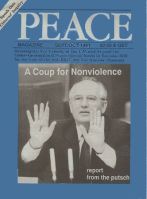
Peace Magazine Sep-Oct 1991, page 16. Some rights reserved.
Search for other articles by Hans Modlich here
The root of the Kurdish dilemma lies in the fact that the U.N. has nothing in its Charter to recognize the right of the Kurds to a homeland.
The Security Council member nations, who know this and who could act to amend the U.N. Charter, are unwilling to do so each for their own self-serving reasons.
In the wake of its unprecedented scale of intervention in the Gulf War, and its tragic aftermath of Kurdish exodus and rebellion, the United Nations must urgently examine its conduct .
We must tackle some basic issues in the U.N. Charter itself and look at what it has to say on the subject of national minority rights. How do we deal with nations held captive within
present-day boundaries of other states?
Is it correct, as initially stated by George Bush, and echoed by Canada's U.N. ambassador Yves Fortier, to stand aside from Saddam Hussein 's persecution of the Kurds as an 'internal affair' of a sovereign state? The present Charter can be cited to say so, but the Geneva Convention maintains the opposite.
Germany's foreign minister Hans Dietrich Genscher explicitly disagreed with Washington, stating that the world community has every right to get involved, out of concerns about genocidal persecution. The European Community proposal for a U.N. supervised security zone in northern Iraq not only has the support of the heads of state of Germany, Britain and France but it clearly has in it the seeds of territorial recognition for the Kurdish nation.
The plight of the Kurds demands a review of the basic tenets of the U.N. as to what constitutes a nation.
Two million of Iraq's population of seventeen million live in the major Kurdish cities of the north. Three million more are integrated in the rest of Iraq. Kurdistan as a whole has a population of twenty million. It is a nation spread over five adjacent states and has a history and culture older than that of the United States. Like Armenia and Palestine-and the world's Jewry of a half-century ago-the Kurds are a nation without a homeland, without recognition by the international community.
If we look closely at other current crisis hot spots around the world, we find that the most prevalent threat to peace emanates from unresolved national questions within the boundaries
of existing nation states-all members in good standing of the U.N. Since Glasnost, especially in the absence of the Cold War polarization, a legion of formerly colonized nations around the globe from East Timor to Quebec is emerging to demand self-government. Kurdistan, Palestine and the Balkans, Kashmir, the Soudan, Eritrea and even Scotland are waiting in the wings.
Yet George Bush's new world order offers little in the way of a consistent vision let alone principled guidelines to resolve these so-called internal conflicts.
Now that the need to reform the U.N. has been raised, we must come to grips with the void in the Charter on the contentious subject of national minorities.
One obvious solution is to expand the U.N. Charter Statement of Principles expressly to recognize that national minorities within member countries must have the right to self-determination and self-government if they choose to exercise that right. U.N. peace-keepers must then be provided to conduct plebiscites or referendums in the affected state or states.
Nationalism in the era of high-tech multi-national capitalism is no longer a divisive economic issue. With increasing prosperity, as we can see in the European Common Market, nationalism in fact recedes.
If we are to usher in a new post Cold War era of peace, stability and North/ South reconciliation then we must first prepare a political framework acceptable to everyone in such a new world order. U.N. reform is that vehicle.
Bolstered by a renewed political and diplomatic authority, a reformed United Nations must outline a step by step process to allow for redrawing of state boundaries. This procedure-like a Family Court for nations-must enable new states to emerge wherever this is justified and verified to be the democratic will of the national minority living in that region. This must be done on the basis of secular linguistic and ethnic make-up, in short national rather than religious criteria, so as to avoid the tensions which still loom for example in the Indian subcontinent or in present day Israel and Iran where church and state are not clearly separated.
It seems apparent that only a series of U.N. supervised plebiscites in Kurdistan can relieve these political faultlines which criss-cross the entire Middle East.
A re-invigorated U.N., freed from the suspicion of being merely an instrument of U.S. foreign policy, can then begin to undertake the long postponed task of a Middle East Peace Conference.
-- Hans Modlich is a small businessman and engineer. His interests and activism in peace issues date back to the Cuban Missile Crisis.

Peace Magazine Sep-Oct 1991, page 16. Some rights reserved.
Search for other articles by Hans Modlich here